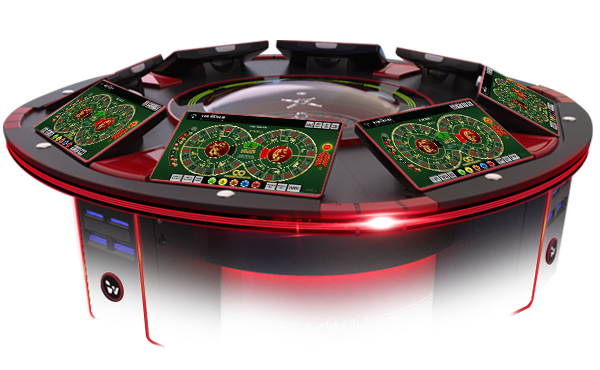
Electronic roulette machines are becoming increasingly popular in casinos. They are quickly gaining popularity as they are simple to play, and there is no need for a dealer to be present.
So, how exactly do electronic roulette machines work and can they cheat? That’s what we’ll be answering in this Wizard Slots blog post.
What Is Electronic Roulette?
Electronic roulette refers to the electronic roulette machines that you find in casinos. Rather than having a croupier, the electronic roulette machine works on its own.
Visually, electronic roulette looks a bit different to standard roulette as the roulette wheel is encased in a glass dome. The glass dome allows all players to see what is going on inside.
Electronic roulette is an entertaining addition to the casino as it’s a live game where a dealer doesn’t need to be present. This may appeal to a lot of players as sometimes a dealer being present makes them nervous!
How Does Electronic Roulette Work?
A glass dome covers the roulette wheel allowing players to see exactly what is going on as they play. Around the wheel, there are a number of seats carefully placed. The number of seats for players varies depending on the design, but it’s usually between 5 and 12.
Before you play electronic roulette, you must first insert your funds into the coin accepter. Next, you select your coin size and then place your bet. Bets are placed using an electronic display of the classic layout. Once you have confirmed your bet and waited for other players to confirm their bets, the game will begin.
To begin a game of electronic roulette, a single-phrase or three-phrase asynchronous engine will prompt the roulette wheel to spin. The ball is then released via an electronic circuit air blower. Sensitive sensors then detect where the ball is. If you correctly guess where the ball lands, then you win!
Does Electronic Roulette Have The Same Odds As Real Roulette?
The basic odds of roulette are the same regardless of whether it is live, electronic or online; it mainly depends on the variation of roulette being played (i.e. the number of zero pockets).
For example, if it’s French or European roulette (single zero), then any given number has a 1 in 37 chance of landing, but if it’s American roulette (double zero), then each number has a 1 in 38 chance.
However, the types of bets available have different odds of winning and different payout odds. For example, the outside bets have a greater chance of winning than the inside bets, but they pay out at smaller odds than the latter.
The payout odds in electronic roulette are the same as in standard roulette. Similarly, the payout odds for each bet are the same across the different variations of roulette. Let’s take a look at some of the bets you can make in roulette and their payout odds:
- Straight Up = 35:1
- Split = 17:1
- Street = 11:1
- Corner = 8:1
- Line = 5:1
- Dozens = 2:1
- Columns = 2:1
- Reds/Blacks, Odds/Evens and Highs/Lows= 1:1
The house edge is also the same for both electronic and real roulette. The house edge is the built-in advantage a casino has over its players. For American roulette, the house edge is 5.26%, and for European roulette, the house edge is 2.70%.
Do Electronic Roulette Machines Cheat?
If you have never played electronic roulette, you may have a few questions about whether it can be rigged.
Sometimes it seems like the house always wins, and that’s because, in the end, they do! We’re not saying you can’t win electronic roulette, but the house does have an advantage over players. This is known as the house edge, and almost every casino game has one.
If you play electronic roulette, it’s important to remember the house edge. The house edge is how the casino makes a profit; it’s the reason the casino always wins in the long run. As such, the casino doesn’t need to rig electronic roulette machines - they have nothing to gain from doing so.
Not to mention that the online casino could lose its license if they’re found to be rigging any games and not complying with gambling regulations.
Electronic roulette machines work in the same way as a standard roulette wheel, except it operates autonomously and doesn’t require a dealer to physically spin the reel and drop the ball. Electronic and mechanical-based systems operate these functions, but the factors resulting in a random outcome remain, such as imperfections on the ball and the wheel, air pressure and humidity, wheel speed, and ball speed.
It would be difficult to rig due to all of the external factors that can affect the outcome.
*All values (Bet Levels, Maximum Wins etc.) mentioned in relation to this game are subject to change at any time.
